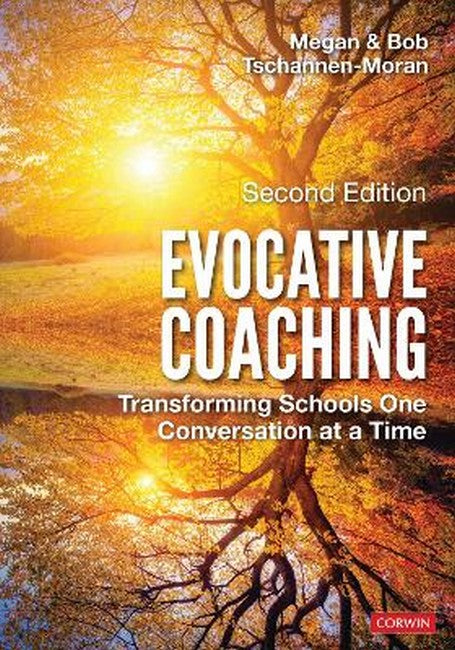Megan Tschannen-Moran (Ph.D., The Ohio State University) is a Professor of Educational Leadership at the William & Mary School of Education. Inspired by her fourteen years of experience as the founder and principal of a school serving primarily low-income and minority students in a distressed neighborhood of Chicago, she is motivated to work at the intersection of theory and practice so that schools grow in their capacity to serve all students well. The coaching model presented in this book sits squarely at that intersection. Megan's scholarly research focuses on relationships of trust in school settings and how these are related to important outcomes such as the collective efficacy beliefs of a school faculty, teacher professionalism, and student achievement. Her book Trust Matters: Leadership for Successful Schools (2nd Ed.) (2014) reports the experience of three principals and the consequences of their successes and failures to build trust. Another line of research explores school climate through the Vibrant School Scale that assesses the degree to which a school fosters enlivened minds, emboldened voice, and playful learning. Bob Tschannen-Moran (M. Div., Yale University) served as the President of LifeTrek Coaching International and as CEO of the Center for School Transformation (www.schooltransformation.com). Bob is a past-President of the International Association of Coaching (www.CertifiedCoach.org). He trained a s a business and life coach through Coach U, CoachVille, FastTrack Coaching Academy, and Wellcoaches Corporation. He served on the faculty of the Wellcoaches Coach Training School and co-authored a Coaching Psychology Manual (2nd Ed) (2015) with Margaret Moore and Erika Jackson. His work on Skills and Performance Coaching is included in The Complete Handbook of Coaching (3rd Ed.) (2017, Sage Publications). Using a variety of strengths-based approaches, Bob has assisted many individuals and organizations, including schools, congregations, and corporations, to build positive relationships and to achieve positive results.
Request Academic Copy
Please copy the ISBN for submitting review copy form
Description
Preface Acknowledgments About the Authors Chapter 1: Introduction to Evocative Coaching The Dynamic Dance of Evocative Coaching: LEAD The Five Concerns of Coaching The Power of Evocative Coaching Coaching from a Variety of Roles Key Points in This Chapter Questions for Reflection and Discussion Chapter 2: Coaching Presence Lessons from a Horse Whisperer Fostering Trust and Rapport Holding the Coaching Space Conveying Coaching Presence Creative Energy Check-In The First Coaching Session Key Points in This Chapter Questions for Reflection and Discussion Loop 1: The No-Fault Turn Chapter 3: Listen for Stories The Power of Story Evoking Teacher Stories Attentive Listening Imaginative Story Listening Key Points in This Chapter Questions for Reflection and Discussion Chapter 4: Empathize for Connection Understanding Empathy Leading with Heart The Language of Compassion The Golden Sigh Key Points in This Chapter Questions for Reflection and Discussion Loop 2: The Strengths-Building Turn The Learning Brief Chapter 5: Appreciate Strengths The Principles of Appreciative Inquiry SOAR-Illuminating the Best of What Is and What Might Be Key Points in This Chapter Questions for Reflection and Discussion Chapter 6: Design-Thinking Designing SMARTER Experiments Choreographing the Coaching Dance Key Points in This Chapter Questions for Reflection and Discussion Chapter 7: The Dynamic Flow of Change Getting into Flow Managing Clouds, Wind, and Thunder Rolling with Resistance Honoring Ambivalence Exploring Culture Change Getting out of the Way Key Points in This Chapter Questions for Reflection and Discussion Chapter 8: The Reflective Coach Hearing Our Own Story Self-Empathy Inquiring Into Our Own Professional Practice Design Our Own Smarter Experiments Professional Coaching Code of Ethics Conclusion Key Points in This Chapter Questions for Reflection and Discussion Appendix: Evocative Coaching Principles, Questions, and Reflections References Index
"Evocative Coaching is a refreshing approach that will get many coaches excited. It dials down to the basic building block of the coaching process that sometimes gets forgotten - the construction of a trusting relationship between the coach and their learning partner. It fosters positivity, amplifies current strengths, and focuses on human connection with a learning partner/coachee, which is a change from the data-crunching, nuts-and-bolts setup of some coaching styles.This is an approach that will help instructional coaches to re-focus and work on their interpersonal skills and the methods they use within their coaching sessions." -- Mike Melie "In Evocative Coaching, the authors model how a coach can stay completely respectful of a teacher while also continuing to find ways to support a teacher in experimenting with and implementing stronger practices. Using the LEAD Model, along with helpful sample coaching conversations and real-life vignettes, authors have created a logical and intuitive resource." . -- Kendra Hanzlik "This book is a must read. It is a must read because it shares wisdom and big heart of the authors. Throughout the book they echo the sentiments of Emerson.. "to find the beauty in others; to leave the world a bit better whether by a healthy child, a garden patch, or a redeemed social condition." -- Jim Thompson "Evocative Coaching presents the next level of coaching and speaks more to how to get a teacher to find the answers within themselves and provide the space for a teacher to explore while taking risks within their instructional practices." -- Frank Chiki

